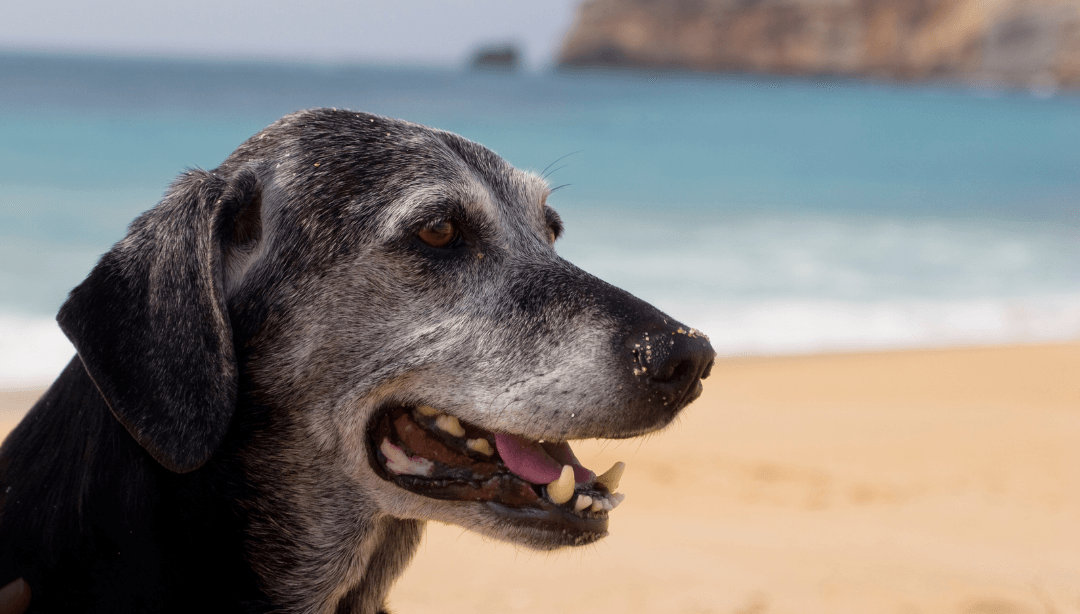Written by Elizabeth Flores | November 15th, 2022
Give your old pal the best life by considering the following things

1. Oral Health
Unfortunately, senior dogs are likely to suffer from tooth decay. This is due to both diet and poor oral hygiene over the course of several years. Here are some things that you can do to prevent or mitigate the consequences of tooth decay.
- Avoid foods or treats high in sugars - Not only is this important for maintaining your dog’s overall wellbeing, this is crucial for dental health. Most formulas on our pet food wall of shame should be avoided for this reason.
- Address your dog's dental pain - Have you noticed a loss of appetite in your old pal? A common problem in senior dogs is that it's too painful for them to chew their food. If so, consider making one of the following modifications:
- If you're feeding a dry dog food diet, consider pouring warm water or bone broth over kibble to soften it.
- As an alternative to kibble, consider a gently cooked food such as A Pup Above or Freshpet, both of which are packed with nutrition and easy to chew. Alternatively, canned dog food is another readily available option that is easier to store than refrigerated foods.
- Avoid plaque - Veterinarians recommend brushing your dog's teeth daily, or at a bare minimum of 2x a week to remove plaque and prevent disease. We sell a variety of toothbrushes and toothpastes appropriate for dogs along with other dental products such as toys, treats, dental wipes, and oral gels. You can browse through some of our products here, but they are available for sale in-store only.
- Don’t hesitate to take your pal to the vet - They might be due for a teeth cleaning, especially if there is noticeable plaque. Left untreated, plaque deteriorates your dog's oral health in stages, leading to gingivitis and eventually periodontal disease. In some cases, having your dog's decaying tooth pulled is the best thing you can do to prevent the surrounding teeth from rotting.
2. Diet Changes
Senior diets are formulated to specifically address the health needs of elderly dogs. As dogs get older, their lifestyles change, their bodies change, and as a consequence they will have different dietary needs. If you haven't done so already, switching to a senior dog food formula just might be the best move. The appropriate diet for your aging dog will contain ingredients that promote the following health needs:
- Maintain a healthy weight - Dogs are less active with age, and are not burning as many calories as they used to when they were puppies. Senior dog food contains less calories per serving while still keeping your pet feeling full. Although we love our adorable, chunky doggos, obesity leads to other health issues and should be prevented if you wish to keep your pet alive and well.
- Bone and joint health - Senior dog food formulas contain glucosamine & chondroitin to support healthy bone and joint functions. These are compounds that are naturally produced in your dog's cartilage and help cushion the impact on their joints. As your dog ages, the natural production of these compounds declines. Adding glucosamine and chondroitin to your senior dog's diet may help reduce pain and inflammation associated with arthritis.
- Healthy gut and a strong immune system -
- The main function of a probiotic is to support food digestion. As dogs age, their digestion abilities decline, which compromises their gastric and intestinal health.
- Probiotics increase the number healthy bacteria in the digestive tract. daily diet will improve their immune strength and prevent them from getting sick often.
- Omega 3 fatty acids comes from cold water fish and provides many therapeutic benefits for dogs, including managing chronic inflammatory disorders like colitis, obesity, inflammatory bowel disease, joint pain from arthritis, and allergic skin problems.
3. Joint Pain
- Glucosamine and chondroitin may be included in a senior formula, also available as supplements
- Glucosamine is a naturally occurring compound made of a sugar and an amino acid, tied to the body’s production of lubricants and shock absorption for healthy joint function. Glucosamine is made in your dog’s cartilage; it’s also a building block for arterial cartilage and helps rebuild damaged cartilage. Glucosamine benefits lots of body parts, including:
- Nails, Tendons, Skin, Eyes, Synovial fluid, Bone, Ligaments, Heart valves, Mucous secretions in the digestive, respiratory, and urinary tracts
- chondroitin is produced in your dog’s body but diminishes with age. A chondroitin sulfate supplement may help hydrate your older, arthritic dog’s cartilage and keep it from breaking down, cushioning some of the impact on his joints. Unlike conventional medications, chondroitin helps alleviate joint pain by addressing the disease process itself and by restoring some integrity to the joint.
- Omega 3 fatty acids comes from cold water fish and provides many therapeutic benefits for dogs, including managing chronic inflammatory disorders like colitis, obesity, inflammatory bowel disease, joint pain from arthritis, and allergic skin problems.
- CBD for pain
4. Exercise
- maintains healthy joints
- weight management - overweight dogs are at a greater risk for disease
- fight depression - keeps their minds occupied
- active lifestyle will help prevent arthritis and muscle loss.
- walking on grass or sand - low impact, avoid extreme weather
- swimming is another great low impact exercise
- follow your dog's pace and don't push them to their limits
5. Accommodate Their Environment
- Raised bowl appropriate for your dogs height - helps prevent unnecessary strain to senior joints when bending.
- orthopedic bed helps ease the pain in dogs with arthritis, painful joints, trouble standing up, mobility issues
- ramps - ramps are better for senior dogs with joint and mobility issues. A dog ramp provides a smooth, gradual rise up to your bed or couch, giving your senior dog a comfortable way to get close to you









































































































